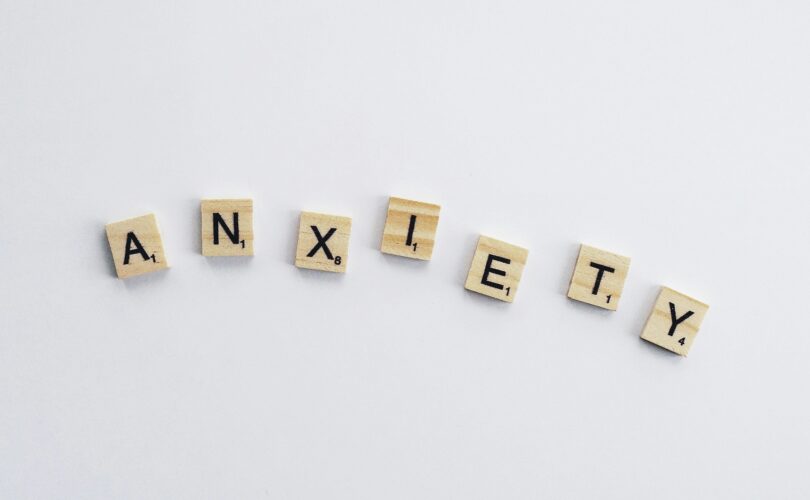In today’s fast-paced world, anxiety has emerged as a widespread concern, impacting millions worldwide. While therapy and medication are traditional pillars of treatment, there’s a sufficient amount of research showing nutrition’s pivotal role in stress management. Our dietary choices don’t merely sustain our bodies; they profoundly influence our mental well-being.
Delving into the intricate relationship between food and anxiety unveils a promising pathway toward holistic healing, revealing how specific dietary components can either heighten or alleviate symptoms of anxiety.

Table of Contents
The Gut-Brain Axis: A Complex Connection
In the journey towards calming the mind and adopting a nutritional approach to managing anxiety, we must grasp the connection between our gut and brain. This link, known as the gut-brain axis, is like a bridge that allows messages to flow between our gut and brain.
Inside our gut, there’s a bustling community of microorganisms called gut microbiota. They do more than help with digestion; they also significantly impact our mood and how we think. But when this community gets out of balance—a situation called dysbiosis—it can cause problems. Harmful bacteria can take over while the good ones diminish, leading to inflammation, messed-up signals in our brains, and even problems with our gut lining.
Research shows that changes in the bacteria in our gut might play a role in anxiety and depression. Our gut’s little nervous system makes neurotransmitters, like serotonin and acetylcholine, which help with gut movement. But they also affect our emotions. This means that when we’re feeling anxious or down, we might feel it in our stomach. And sometimes, problems with our gut, like constipation or stomach pain, can make us feel more anxious or down. Understanding this connection gives us a whole new way to think about managing anxiety through what we eat.
Curious to know what exactly is happening in your gut? Transform your health with Viome’s personalized wellness solutions. Using advanced microbiome analysis, Viome provides tailored nutrition and lifestyle recommendations to optimize your gut health and overall well-being. Discover the power of precision health with insights that help you achieve better digestion, energy levels, and immune support. Use code ERICA110 for a discount :).
The Impact of Diet on Gut Health and Anxiety
Microbiota Modulation
Specific dietary components, such as fiber-rich foods, prebiotics, and probiotics, can influence the composition and diversity of the gut microbiota. Fiber serves as fuel for beneficial bacteria, promoting their growth and proliferation. Prebiotics, found in foods like garlic, onions, and asparagus, selectively stimulate the growth of beneficial bacteria. On the other hand, probiotics introduce live microorganisms into the gut, bolstering its population of beneficial bacteria.
Inflammation Reduction
Persistent inflammation has been linked to the development of anxiety disorders. A diet high in refined sugars, processed foods, and unhealthy fats can fuel inflammation by provoking immune reactions and oxidative stress. Conversely, opting for an anti-inflammatory diet centered around whole foods abundant in antioxidants, omega-3 fatty acids, and phytonutrients offers protection against anxiety by curbing inflammation.
Neurotransmitter Regulation
Nutrients derived from food serve as precursors for synthesizing neurotransmitters, chemical messengers that transmit signals between neurons in the brain. For instance, tryptophan, an essential amino acid found in protein-rich foods like poultry, dairy, and soy products, is a precursor for serotonin, a neurotransmitter implicated in mood regulation.
Moreover, specific vitamins and minerals, such as vitamin B6, magnesium, and zinc, are cofactors in synthesizing and metabolizing neurotransmitters like serotonin, dopamine, and GABA. Deficiencies in these micronutrients have been associated with mood disorders, including anxiety.
A Nutritional Approach To Anxiety
Complex Carbohydrates
Complex carbohydrates, found in whole grains, fruits, and vegetables, promote the production of serotonin, a neurotransmitter known as the “feel-good” hormone. Incorporating oats, quinoa, sweet potatoes, and bananas into your diet can help stabilize mood and reduce anxiety.
Omega-3 Fatty Acids
Omega-3 fatty acids, primarily found in fatty fish like salmon, mackerel, and sardines, have anti-inflammatory properties that support brain health. These essential fats are linked to lower levels of anxiety and depression; for vegetarians and vegans, flaxseeds, chia seeds, and walnuts provide plant-based alternatives rich in omega-3s.
Probiotics
Probiotics replenish and maintain a healthy balance of beneficial bacteria in the gut microbiota. These live microorganisms, often called “good” bacteria, benefit the body, especially for anxiety.
Probiotics help inhibit the growth of harmful bacteria by competing for resources and adhesion sites within the gut, thus preventing the colonization of pathogenic microbes. Additionally, certain strains of probiotics, such as Lactobacillus and Bifidobacterium species, have been specifically associated with reducing anxiety and promoting mental well-being. These strains produce bioactive compounds, such as neurotransmitters like serotonin and gamma-aminobutyric acid (GABA), which can directly influence mood and cognition through the gut-brain axis.
A great probiotic that I generally recommend, when probiotics are needed ;), is Just Thrive. Their spore-based probiotic formula is designed to survive the digestive process, delivering beneficial bacteria directly to your gut. This helps support digestion, boost immunity, and enhance overall wellness. Just Thrive Probiotics are clinically proven, non-GMO, and free from gluten, dairy, and soy, making them a safe and effective choice for everyone. Use code EB15 for a discount :).
More Protein
In addition to embracing a diverse array of nutrient-rich foods, ensuring adequate protein intake at each meal is paramount in the nutritional approach to anxiety management. Protein-rich foods, such as serotonin and dopamine, provide essential amino acids for synthesizing neurotransmitters crucial for mood regulation.
Incorporating protein sources such as lean meats, poultry, fish, eggs, tofu, and legumes into each meal helps maintain stable blood sugar levels. It also promotes feelings of satiety, thereby preventing energy crashes and mood fluctuations throughout the day.
I recommend consuming 20-30 grams of protein per meal to support optimal mental and physical health. Protein consumption also supports repairing and maintaining bodily tissues, including those involved in the intricate gut-brain axis, further fortifying resilience against anxiety triggers.

Magnesium-Rich Foods
Magnesium plays a crucial role in regulating neurotransmitters and calming the nervous system. Leafy greens, nuts, seeds, and legumes are all abundant sources of magnesium. Incorporating these foods into your diet can help alleviate anxiety symptoms and promote relaxation.
Antioxidant-Rich Foods
Antioxidants protect the body from oxidative stress, which can contribute to anxiety and other mental health disorders. Colorful fruits and vegetables like berries, spinach, kale, and bell peppers contain antioxidants like vitamin C and flavonoids. Including these foods in your diet can help combat the damaging effects of stress on the body and mind.
Ashwagandha
Ashwagandha, also known as Withania somnifera or Indian ginseng, is an ancient medicinal herb with a rich history in traditional Ayurvedic medicine. Widely regarded as an adaptogen, ashwagandha helps the body adapt to stressors by modulating the stress response and promoting a sense of calmness and relaxation.
Its active compounds, including withanolides, have been studied for their potential to reduce cortisol levels, the primary stress hormone, thereby alleviating anxiety symptoms. Research suggests that ashwagandha may also enhance resilience to stress by protecting the brain from oxidative damage and supporting the balance of neurotransmitters involved in mood regulation, such as serotonin and GABA.
Additionally, ashwagandha has been associated with improvements in sleep quality, which is closely linked to anxiety disorders.
*As with any supplement, it’s essential to consult with a healthcare provider before incorporating ashwagandha into your wellness routine, especially if you have underlying health conditions or are taking medications.
Foods to Avoid
Just as certain foods can promote mental well-being, others can exacerbate anxiety symptoms. Limiting or avoiding the following can help manage anxiety:
Caffeine: While many people rely on caffeine for a quick energy boost, excessive consumption can worsen anxiety symptoms. Caffeine stimulates the release of adrenaline, the “fight or flight” hormone, which can heighten nervousness and agitation. Additionally, caffeine can interfere with sleep quality, leading to fatigue and exacerbating anxiety the following day. Moreover, caffeine can disrupt gut health by increasing stomach acid production, potentially leading to gastrointestinal discomfort and exacerbating symptoms like heartburn or indigestion.
Processed Foods: Processed foods are often high in refined sugars, unhealthy fats, and artificial additives, all of which can negatively impact both mental and physical health. High-sugar foods can cause rapid spikes and crash in blood sugar levels, leading to mood swings, irritability, and increased anxiety. Furthermore, processed foods lack essential nutrients and fiber in whole foods, which are crucial for maintaining gut health. The additives and preservatives commonly found in processed foods may also disrupt the balance of gut bacteria, contributing to dysbiosis and inflammation.
Excessive Alcohol: Alcohol is a central nervous system depressant that can initially induce feelings of relaxation and euphoria. However, as blood alcohol levels rise and then fall, it can lead to rebound anxiety and dysphoria. Chronic alcohol consumption can also disrupt neurotransmitter balance in the brain, contributing to mood disorders like anxiety and depression.
Additionally, alcohol can damage the lining of the gastrointestinal tract, leading to inflammation and gut barrier dysfunction. This disruption in gut health can further exacerbate anxiety symptoms and contribute to overall mental distress.
Conclusion
While food alone cannot cure anxiety, a balanced diet complements traditional treatments and promotes overall well-being. By nourishing our bodies with foods that support gut health and reduce inflammation, we can empower ourselves to manage anxiety better and cultivate inner peace.
Remember, even small dietary changes can significantly improve mental health over time. So, let food be thy medicine as you embark on your journey towards healing and resilience.
Thanks for being here with me. E
Images courtesy of Pexels or are my own.
If you are pregnant, breastfeeding, or taking medications, consult with your doctor before starting a supplement routine. It is always optimal to consult with a healthcare provider when considering what supplements are right for you.
Some of the links are affiliate links, meaning that if you click on the links and make a purchase, I may receive a commission. This commission comes at no additional cost to you. Please note that I only recommend products and services that I have personally used and believe in.




